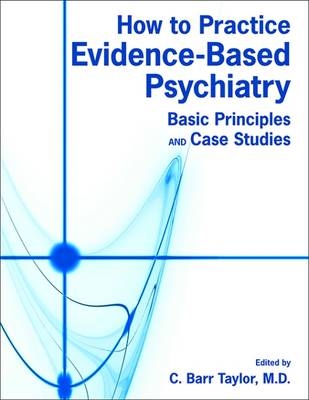
How to Practice Evidence-Based Psychiatry
American Psychiatric Association Publishing (Verlag)
978-1-58562-365-5 (ISBN)
The use of evidence-based guidelines and algorithms is widely encouraged in modern psychiatric settings, yet many practitioners find it challenging to apply and incorporate the latest evidence-based psychosocial and biological interventions. Now, practitioners have an outstanding new resource at their fingertips. How to Practice Evidence-Based Psychiatry: Basic Principles and Case Studies accomplishes two goals: it explains the methods and philosophy of evidence-based psychiatry, and it describes ways in which psychiatrists and other mental health specialists can incorporate evidence-based psychiatry into their clinical practices. Uniquely relevant to psychiatric clinicians, this is the only book on evidence-based medicine specific to the field of psychiatry that addresses integrated psychopharmacology and psychotherapies.
This new book first provides an expansion on the popular text the Concise Guide to Evidence-Based Psychiatry, updating the sections on clinical trials, the teaching of evidence-based medicine, and the effective treatment of patients with complex comorbid conditions. It then allows experts from a variety of specialty areas and practice settings to describe how they incorporate the latest evidence and outcome studies into interesting and inspiring cases of their own.
The book starts with the assumption that clinicians must adapt guidelines, algorithms, other sources of evidence, and the interpretation of this evidence to each individual patient. It describes basic statistical concepts in an easily understood format and offers separate chapters devoted to systematic reviews and meta-analyses, clinical practice guidelines, diagnostic tests, surveys of disease frequency, and prognosis and psychometric measurement. It also presents an easily relatable discussion of many of the major issues of evidence-based psychiatry, such as use of the "Five-Step" evidence-based medicine model.
• The first section can be used both as an introduction to the topic and a ready reference for researching the literature and appraising evidence.
• The second section includes relevant case examples of major psychiatric disorders, and the third presents case examples from diverse treatment settings. In these sections, 24 contributing clinicians from a variety of practice settings discuss situations in which they followed aspects of evidence-based care.
• The text includes tables and charts throughout the text, including algorithms, guidelines, and examples of simple, therapist-devised measures of progress, further enhance learning, retention, and clinical practice.
How to Practice Evidence-Based Psychiatry: Basic Principles and Case Studies is a valuable new tool that will help residents, practicing psychiatrists, and other mental health workers find the most useful and relevant information to inform and improve their everyday practices.
C. Barr Taylor, M.D., is Professor of Psychiatry and Behavioral Sciences at Stanford University School of Medicine, Stanford, California.
Contributors
Disclosure of Interests
Foreword
Preface
Cautionary Statement
Acknowledgments
PART I: Basic Principles of Evidence-Based Psychiatry
Chapter 1. What Is Evidence-Based Psychiatric Practice?
Chapter 2. The 5-Step Evidence-Based Medicine Model
Chapter 3. Asking Answerable Questions
Chapter 4. Searching for Answers
Chapter 5. Clinical Trials
Chapter 6. Systematic Reviews and Meta-Analyses
Chapter 7. Clinical Practice Guidelines
Chapter 8. Measurement
Chapter 9. Diagnostic Tests
Chapter 10. Surveys of Disease Frequency
Chapter 11. Studies of Risk or Harm
Chapter 12. Studies of Prognosis
Chapter 13. Evaluating Your Performance of Evidence-Based Medicine
Chapter 14. Evidence-Based Psychiatric Practice
Chapter 15. Teaching Evidence-Based Medicine and Evidence-Based Psychiatric Practice to Psychiatry Residents
PART II: Case Studies: Evidence-Based Medicine Applied to Major DSM-IV Disorders
Chapter 16. Introduction to the Cases
Chapter 17. Panic Disorder
Chapter 18. Major Depressive Disorder and Bulimia Nervosa
Chapter 19. Depression, Refusal to Eat, and Nasopharyngeal Carcinoma
Chapter 20. Anorexia, Obsessive-Compulsive Disorder, and Depression
Chapter 21. Major Depressive Disorder: A MEASUREMENT-BASED CARE APPROACH
Chapter 22. Major Depressive Disorder, Severe With Psychotic Features
Chapter 23. Acute Bipolar Depression
Chapter 24. Obsessive-Compulsive Disorder
Chapter 25. Schizophrenia: A FAMILY PSYCHOEDUCATIONAL APPROACH
Chapter 26. Substance Use Disorder Presenting as a Mood Disorder
Chapter 27. A Complex Personality Disorder Case
Chapter 28. Bulimia Nervosa
PART III: Case Studies: Evidence-Based Psychiatric Practice in Different Settings
Chapter 29. Dual Diagnosis (PTSD/SUD) Treated in a Veterans Affairs Health Care Facility
Chapter 30. Severe, Recurrent Depression Managed in a Remote Setting Via the Internet: AN EXAMPLE OF REMOTE CARE USING THE HEALTHSTEPS SYSTEM
Chapter 31. Postpartum Depression Treated in Private Practice
Chapter 32. Bipolar Disorder Treated in the Kaiser Permanente Health Care System
Chapter 33. Consultation-Liaison Psychiatry
Chapter 34. Alcohol Dependence Treated by a Psychiatry Resident
Appendices
A: Glossary
B: Statistical Formulas and Tables
Index
| Erscheint lt. Verlag | 29.12.2009 |
|---|---|
| Zusatzinfo | 52 Line drawings, black and white; 91 Tables, unspecified |
| Verlagsort | VA |
| Sprache | englisch |
| Maße | 216 x 279 mm |
| Gewicht | 1039 g |
| Themenwelt | Medizin / Pharmazie ► Medizinische Fachgebiete ► Psychiatrie / Psychotherapie |
| ISBN-10 | 1-58562-365-2 / 1585623652 |
| ISBN-13 | 978-1-58562-365-5 / 9781585623655 |
| Zustand | Neuware |
| Haben Sie eine Frage zum Produkt? |
aus dem Bereich


